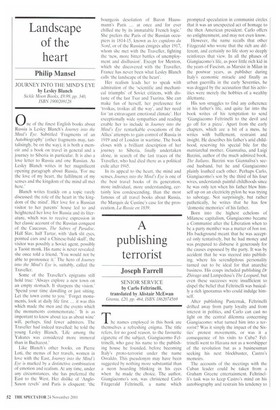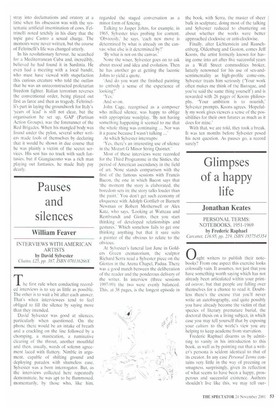A publishing terrorist
Joseph Farrell
SENIOR SERVICE by Carlo Feltrinelli, translated by Alistair McEwan Granta. 120, pp 464, ISBN 1862074569 The names employed in this book are themselves a refreshing enigma. The title refers, for no good reason, to the favourite cigarette of the subject, Giangiacomo Feltrinelli, who gave his name to the publishing house he founded, before becoming Italy's proto-terrorist under the name Osvaldo. This pseudonym may have been suggested by nothing more substantial than a neon hoarding blinking in his eyes when he made the choice. The author, Giangiacomo's son, was christened Carlo Fitzgerald Feltrinelli, a name which
prompted speculation in communist circles that it was an unexpected act of homage to the then American president. Carlo offers no enlightenment, and may not even know.
However, the name recalls that other Fitzgerald who wrote that the rich are different, and certainly no life story so deeply reinforces that view. In all the phases of Giangiacomo's life, as poor little rich kid in the years of Fascism, as Marxist in Milan in the postwar years, as publisher during Italy's economic miracle and finally as urban guerrilla in the early Seventies, he was dogged by the accusation that his activities were merely the hobbies of a wealthy dilettante.
His son struggles to find any coherence in his father's life, and quite far into the book writes of his temptation to send 'Giangiacomo Feltrinelli to the devil and go off for a pizza'. Apart from the early chapters, which are a bit of a mess, he writes with bafflement, restraint and insight. He describes his father's arid childhood, reserving his special bile for the matriarchal mother. Giannalisa, and Luigi Barzini, author of the much admired book, The Italians. Barzini was Giannalisa's second husband, but he and Giangiacomo plainly loathed each other. Perhaps Carlo, Giangiacomo's son by the third of his four wives, understands painful childhoods since he was only ten when his father blew himself up on an electricity pylon he was trying to sabotage. Not surprisingly, but rather pathetically, he writes that he has few 'domestic memories' of his father.
Born into the highest echelons of Milanese capitalism, Giangiacomo became a Communist after the Liberation when to be a party member was a matter of bon ton. His background meant that he was accepted only tentatively, but he had money and was prepared to disburse it generously for the causes espoused by the party. It was by accident that he was steered into publishing, where his serendipitous personality turned out to be ideal for that anarchic business. His coups included publishing Dr Zhivago and Lampedusa's The Leopard, but even these successes were insufficient to dispel the belief that Feltrinelli was basically a rich ignoramus who could indulge himself.
After publishing Pasternak, Feltrinelli drifted away from party loyalty and from interest in politics, and Carlo can cast no light on the central dilemma concerning Giangiacomo: what turned him into a terrorist? Was it simply the impact of the Sixties' protest movements, or was it a consequence of his visits to Cuba? Feltrinelli went to Havana not as a worshipper of the revolution but as a businessman seeking his next blockbuster, Castro's memoirs.
The accounts of the meetings with the Cuban leader could be taken from a Graham Greene entertainment. Feltrinelli's task was to keep Castro's mind on his autobiography and restrain his tendency to stray into declamations and oratory at a time when his obsession was with the systematic artificial insemination of cows. Feltrinelli noted tetchily in his diary that the topic gave Castro a sexual charge. The memoirs were never written, but the course of Feltrinelli's life was changed utterly.
In his revolutionary fervour, he searched for a Mediterranean Cuba and, incredibly, believed he had found it in Sardinia. He even had a meeting with a local bandit, who must have viewed with stupefaction this curious creature who told the outlaw that he was an unreconstructed proletarian freedom fighter. Italian terrorism reverses the conventional order, being played out first as farce and then as tragedy. Fehrinelli's part in laying the groundwork for Italy's 'years of lead' is still not clear, but the organisation he set up, GAP (Partisan Action Groups), was the forerunner of the Red Brigades. When his mangled body was found under the pylon, several sober writers made fools of themselves by declaring that it would be shown in due course that he was plainly a victim of the secret services. His son has no truck with such fantasies, but if Giangiacomo was a rich man playing out fantasies, he made Italy pay dearly.



















































































 Previous page
Previous page